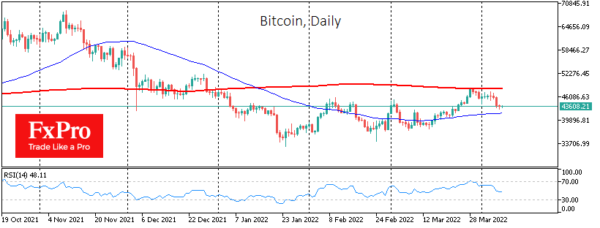Bitcoin rose slightly, by 0.6%, to $43.6K. Ethereum added 1.6%, while other leading altcoins from the top 10 showed mixed dynamics: a 3% decline (Terra) to 6.2% growth (Solana).
Total crypto market capitalisation, according to CoinMarketCap, rose 1.2% to $2.02 trillion overnight. Bitcoin’s dominance index declined 0.4% to 40.9%.
The cryptocurrency Fear and Greed Index was up 3 points to 37 by Friday but did not come out of the “fear” state.
Bitcoin briefly dipped below $43K on Thursday but, by the end of the day, had offset most of the decline, remaining near Thursday’s closing levels amid a rebound in US stock indices.
According to Bloomberg, a renewed slide in stock indices could hit bitcoin hard. Short-term risks are rising as the US Federal Reserve intensifies its fight against inflation and rising interest rates and intends to embark on aggressive balance sheet cuts.
In contrast, Galaxy Digital CEO Michael Novogratz believes bitcoin is gradually losing its correlation with stock indices. He believes lower inflation and a stabilising economy will push bitcoin up.
Meta is exploring the possibility of creating a cryptocurrency for the meta-universe to boost revenues due to the decline in popularity of their cash cow apps, Facebook and Instagram.
Russian Prime Minister Mikhail Mishustin said that 10 million Russians have over 10 trillion roubles ($128 billion) in crypto wallets, which is just under $1,000 per Russian resident. He also called for regulation of cryptocurrencies, although he rejected their recognition as a means of payment.
The Economist Intelligence Unit believes that the war will accelerate Ukraine’s cryptocurrency adoption. From examples in Africa, the Middle East, and Latin America, we have previously seen that the use of cryptocurrencies increases dramatically when national economies and local currencies weaken.

